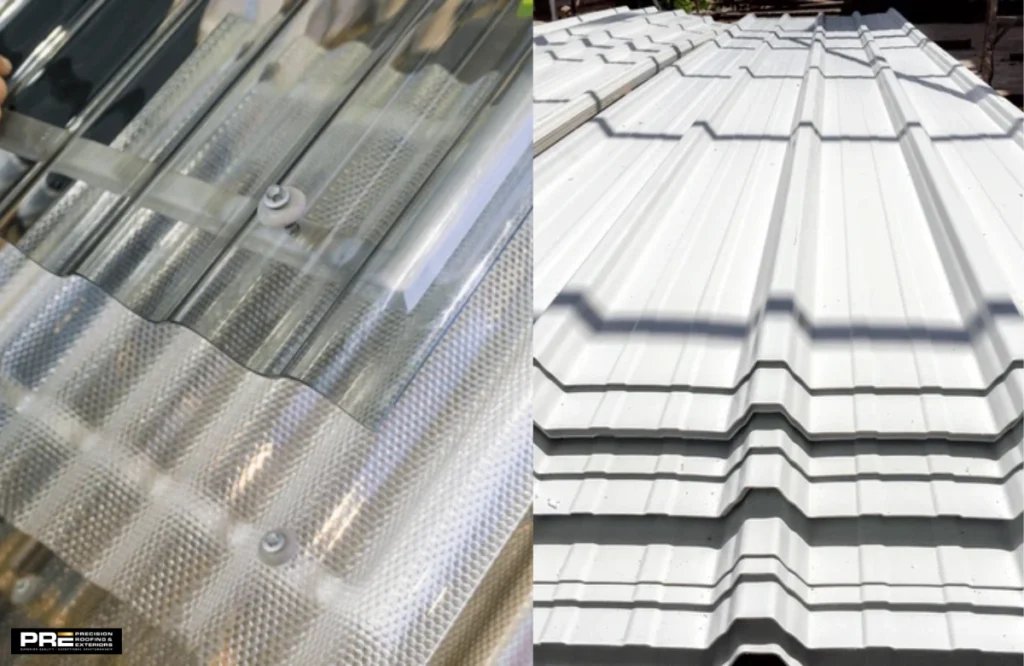Not all plastic roofing is the same. Two names you’ll hear often are polycarbonate and PVC. At first glance, they might look similar because both are lightweight, weather-resistant, and easier to install than heavy tiles or metal. But they play very different roles.
Polycarbonate is the tough material used in greenhouses, skylights, and patios where strength and clarity matter. PVC is the budget-friendly option, rolled out on flat roofs or used in corrugated sheets for sheds and warehouses. So which is better? The truth is, polycarbonate works best when you want light and durability. PVC works best when cost, speed, and practicality are the priorities.
What Is Polycarbonate Roofing?
Polycarbonate is a thermoplastic sheet known for being almost unbreakable. If you hit it with hail or drop a branch on it, it’ll likely stay intact. That strength is why it’s popular in spaces where roofs need to handle rough weather but still let sunlight in.
You’ve probably seen it without realizing: greenhouse panels, stadium covers, pergolas. The material can be crystal clear, slightly tinted, or treated with coatings to block harsh UV rays. People like it because it’s lightweight yet sturdy, easy enough to handle during installation, and once it’s in place, it stays strong for 20 to 25 years or more.
It’s not the cheapest option, but that’s the trade-off. Pay more upfront, get a roof that doesn’t yellow or crack easily and keeps working long after thinner plastics wear out.
What Is PVC Roofing?
PVC (Polyvinyl Chloride) takes a different approach to roofing. It’s built less for brute strength and more for flexibility, versatility, and cost-effectiveness. You’ll find it in two main forms: corrugated panels for sheds and carports, or seamless sheets used on flat and low-slope commercial roofs.
On those wide commercial rooftops, PVC sheets are heat-welded together to create a single, watertight layer. That’s why it’s a favorite for restaurants, factories, and shopping centers. It stands up well to rain, chemicals, and everyday wear.
Its weakness lies in impact resistance. A heavy branch that might bounce off polycarbonate could crack PVC. Even so, when cost, speed, and practicality take priority, PVC remains a smart, reliable choice.
Comparing Polycarbonate and PVC Roofing
Here’s where the differences really show:
| Feature | Polycarbonate | PVC |
| Durability | Extremely tough, resists hail and debris | Durable, but cracks under heavy impact |
| Light Transmission | High, can be clear or tinted | Usually opaque or semi-transparent |
| Cost | Higher initial investment | More affordable upfront |
| Weight | Lightweight, but thicker sheets | Very lightweight, thinner overall |
| Weather Resistance | UV-stable, handles harsh climates well | Great against water and chemicals, but less UV stable |
| Lifespan | 20+ years if maintained | 10–15 years on average |
| Best Use | Patios, skylights, greenhouses, pergolas | Flat roofs, sheds, garages, warehouses |
PVC Roofing vs. Polycarbonate: Which Is Better?
If you’re chasing durability and light, polycarbonate takes the win. It stands up to storms, lasts longer, and looks modern in residential settings. Think patios that feel open, carports that don’t darken the driveway, or greenhouses that need maximum clarity.
PVC has its moment, too. For flat commercial roofs, where square footage is massive, the lower cost matters more than impact resistance. The same goes for smaller, practical projects like a backyard shed or garage. Why overspend if PVC will get the job done?
So, which is better? Polycarbonate usually edges out PVC for homes that value appearance and long-term durability. For large-scale or budget-driven builds, PVC is the smarter call.
Conclusion
Polycarbonate and PVC both deliver strong results, just in different ways. Polycarbonate is tough, light-friendly, and built for the long haul. PVC is cost-effective, flexible, and perfect for wide commercial roofs or smaller, practical projects.
So which is better? Polycarbonate is worth the higher price for residential patios, greenhouses, and spaces where strength and sunlight are key. PVC makes sense for businesses or property owners watching costs without cutting corners on protection.
And here’s the final point: the material is only half the story. A roof lasts because it’s installed correctly. That’s where a experienced roofing company Precision Roofing & Exteriors steps in. Our team works with both systems and knows how to match the right roof to the right project.

